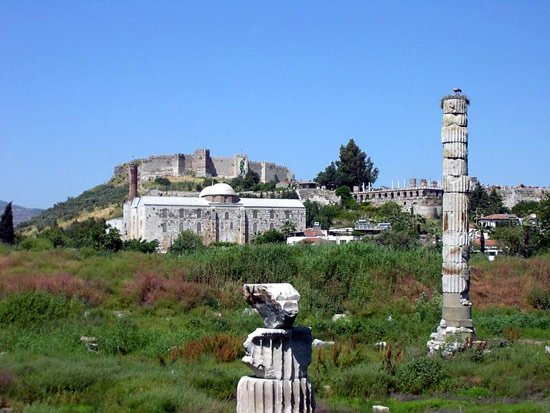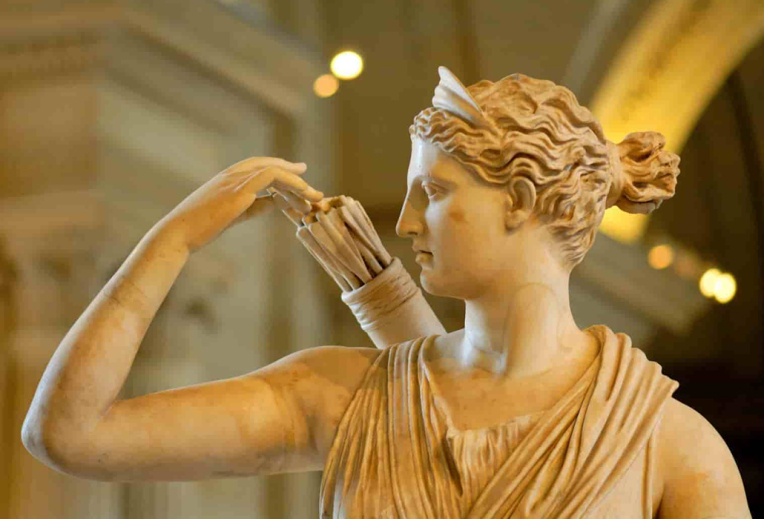Written by Ed Whalen, Contributing Writer, Classical Wisdom
The Classical World is often seen as an age of reason and philosophy. In reality, the vast majority of people were very superstitious and belief in magic was very common. Spells, magical formulas, and incantations were popular and widely used. Some of the best known magical formulas from the Classical Word are the Ephesia Grammata or ‘Ephesian Words’.
The Meaning of Ephesia Grammata
The meaning of the words has long been a mystery. Even in ancient times, no one was sure what the words meant. The Pythagorean philosopher Androcydes regarded the Ephesia Grammata as part of an allegorical language that provided insights into the nature of the divine. Some believe that words derived from the legendary race associated with the Great Mother Goddess (Rhea) known as the Dactyls. The formula fascinated both pagan and Christian writers.
A good example of the magical words is the following:
‘ΑΣΚΙ(ΟΝ) ΚΑΤΑΣΚΙ(ΟΝ) ΛΙΞ ΤΕΤΡΑΞ ΔΑΜΝΑΜΕΝΕΥΣ ΑΙΣΙΟΝ (or ΑΙΣΙΑ)
The English translation is the following ‘aski(on) kataski(on) lix tetrax damnameneus aision (aisia)’.
It is not known whether words were deliberately meaningless or if they were derived from a long-lost ancient language.
The magical formula became very well-known in the Greek-speaking world, where they were ascribed on temples dedicated to Artemis, or statues of the goddess. It became part of the everyday speech as a by-word for magic, just like abracadabra is today. Belief in their power was widespread. Marcus Aurelius, the great Philosopher and Emperor, was also known to recite the Ephesia Grammata to keep fear and harm away.
The Ephesia Grammata and Ephesus
As their name indicates, the Ephesia Grammata are named after the great city of Ephesus. It was once the most important metropolis in Ionia, which is now the southwest coast of Turkey.
The words were believed to have been inscribed into the pedestal of the statue of Artemis, the Greek goddess of strategy, the moon, hunting and midwifery. This statue was placed at the heart of the Temple of Artemis which was built in about 550 BC. Her temple is regarded as one of the Seven Wonders of the Ancient World.
The Ephesian Artemisia festival, which is dedicated to Artemis, was one of the most popular in the Hellenic World and likely played a role in popularizing the Ephesia Grammata.
The Ephesia Grammata: Magical Words
Ephésia grámmata or the ‘Ephesian letters’, are a series of verses believed incomprehensible even to the ancients and held to have magical properties. As far as we know, the words made no sense but their sounds were believed to be powerful.
When spoken or read by a person, the words could help to avert evil. Some believed that the words also could help the speaker to achieve salvation. The magical formula was used for many purposes. For example, it was spoken at the marriage of newlyweds for their protection and good fortune.
According to Plutarch, magicians would urge those possessed by demons to recite the Ephesia Grammata during exorcisms. The words were also thought to protect a person from physical danger if recited or inscribed upon an amulet.
According to legend, Croesus recited the words to save himself from the pyre after he was captured by Cyrus the Great.
Many believed that the words, if recited, could give a person heightened mental and physical powers. For this reason, the magical formula was popular with fighters preparing for a match.
The Mystery of the Ephesia Grammata
Some claim that the magical formula is derived from the Babylonians. The Greeks often associated magical spells and practices with Babylon. That said, there is no evidence the Ephesia Grammata came from that culture. Similarly, there are no reasons to believe that the magical words were associated with a mystery religion dedicated to Orpheus or the Dactyls.
Another possibility is that the words are associated with Apollo and were designed to heal the afflicted; this is argued by several scholars. Excavations have found an altar dedicated to possibly a ‘Great Mother Goddess’ an early version of Cybele, where the statue of Artemis with the inscribed magical words once stood. Therefore, the words may have ultimately been once part of some Anatolian cult that was appropriated by the Ionian Greeks when they colonized the area (c 800 BC).
The powerful words became associated with the cult of Artemis. It is likely that the Greeks, while venerating the words as magical, lost the ability to understand their original meaning. The magical formula illustrates the influence of non-Hellenic beliefs on Greek religion and belief.
Conclusion
Magical practices and beliefs were ubiquitous in the ancient world. The Ephesia Grammata are possibly of pre-Hellenic origin, yet another demonstration of how the Greeks were open to other cultural influences. These words became associated with the cult of Artemis, one of the most popular goddesses in the Classical world. The mysterious magical formula was invoked by many people, and the words found everywhere from shrines to personal amulets.
Reference:
McCown, C.C., 1923, January. The Ephesia grammata in popular belief. In Transactions and Proceedings of the American Philological Association (Vol. 54, pp. 128-140). Johns Hopkins University Press, American Philological Association.













No comments yet. You should be kind and add one!
Our apologies, you must be logged in to post a comment.